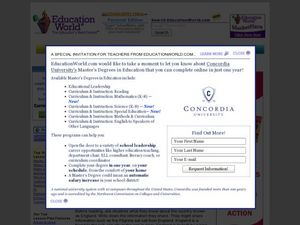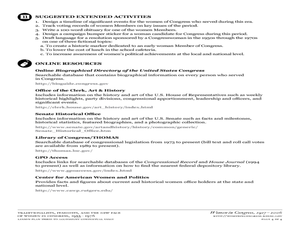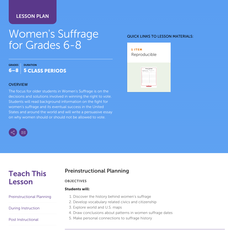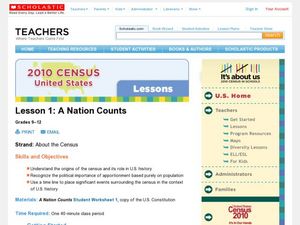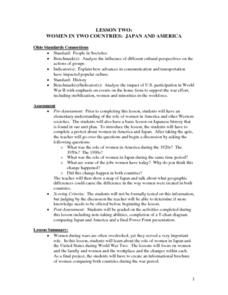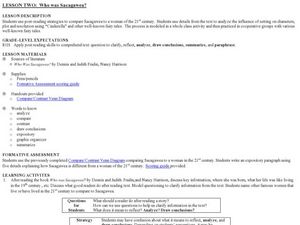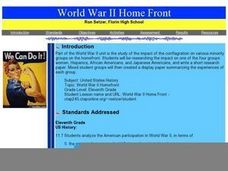National History Day
Challenging the Status Quo: Women in the World War I Military
Why are some so resistant to change? The status quo is often to blame for a lack of forward movement in society. Following the events of World War I, women in America suddenly had a voice—and were going to use it. Scholars use the second...
NPR
This Isn't Right: Women Reform Leaders
The 20th century saw many new possibilities open up to women in America, thanks to many well-known female historical figures — and some women who are not as famous but who are equally accomplished. Learn about the women who contributed...
National Endowment for the Humanities
Who Were the Foremothers of the Women's Suffrage and Equality Movements?
Young scholars complete a unit of lessons on the women who contributed to the early Women's Rights Movement in the U.S. They conduct Internet research, examine images online, develop a list of women, complete a worksheet, and create a...
Curated OER
British Royalty Tours the U.S.
Students share their knowledge of England, then read a news article about Prince Charles's anticipated visit to the U.S. In this current events lesson (written prior to Prince Charles's visit), the teacher introduces the article with a...
Curated OER
A Changing of the Guard: Traditionalists, Feminists, and the New Face of Women in Congress
Young scholars explore the role of women as Congressional leaders. In this women's rights instructional activity, students identify and investigate the impact of women representatives and senators in the U.S. Legislative Branch....
National Endowment for the Humanities
Women's Lives Before the Civil War
Women's lifestyles before the Civil War made a huge impact as a point of causation. Give middle schoolers the opportunity to view firsthand the lives of women before the Civil War. They analyze primary source documents, view photographs,...
Carolina K-12
African Americans in the United States Congress During Reconstruction
The Civil Rights Act of 1866, which granted citizenship to all males in the U.S., resulted in the first African Americans to be elected to Congress. Class members research 11 of these men, the challenges they faced, and craft...
C3 Teachers
Women’s Rights: What Does It Mean to Be Equal?
A guided-inquiry lesson asks seventh graders to research the compelling question, "What does it mean to be equal?" Guided by three supporting questions, researchers complete three formative performance tasks and gather evidence from...
Curated OER
Eighteenth-Century Slave Codes
Students explore slavery by reviewing the written laws intended to keep African Americans subservient. In this U.S. slavery lesson, students analyze a time-line of the history of African Americans. Students discuss the patterns of the...
Curated OER
Where are the Famous Women in History?
Students investigate sexism in history by identifying important women from the U.S. In this women's equality lesson plan, students discuss why they remember more men in the history of the U.S. than women. Students compare women's and...
Scholastic
Women's Suffrage for Grades 6–8
Learners study the decisions and solutions involved in winning the right to vote. After reading background information on the fight for women's suffrage, including one woman's story, and its eventual success in the United States and...
Curated OER
A Nation Counts
Students explore the functions of the U.S. Census. In this civics lesson plan, students understand the origins of the census and its role in U.S. history, recognize the political importance of apportionment based purely on population,...
Curated OER
Tejana Military Members in World War II
Seventh graders discover who the Tejanas were and how they contributed to World War II. In this World War II lesson, 7th graders listen to their instructor discuss who the Tejanas were prior to researching the contributions of three of...
National Endowment for the Humanities
Fly Girls: Women Aviators in World War II
Explore contributions of Women Airforce Service Pilots (WASPs) during World War II with an engaging history lesson. Middle schoolers examine portrayals of women in World War II posters and newsreels, compare and contrast them with...
Curated OER
Women in Two Countries: Japan and America
Students explore the role of women in Japan and the United States during World War Two. They focus on women and the family and women and the workplace and the changes within each. Students create an informational brochure of women...
TCI
Ain't I a Woman?
Learners discover the impact of women on civil rights in United States history by analyzing primary source clues to identify influential female figures.
Curated OER
Women's Suffrage
Tenth graders examine the role of women in the early 1900s. In groups, they use the internet to research groups who favored or opposed giving women the right to vote. To end the lesson, they note the methods used by women to finally gain...
Curated OER
African American Women Trailblazers
Students take a closer look at the accomplishments of African-American women. In this African-American history lesson, students explore the work of Bessie Coleman, Gwendolyn Bennett, Lulu Madison White, and Zelma Watson George as they...
Curated OER
The National Women's Party and the Enfranchisement of Black Women
Young scholars analyze the attitudes and hostility given to African-American women within the National Women's Party. They finish the lesson by examining another moment in the party's history and writing about it.
Curated OER
Who Was Sacagawea?
Explore famous women in U.S. history by creating a Venn Diagram, The focus of this Sacagawea biography instructional activity is for learners to discuss the triumphs and contributions of Sacagawea's life and compare her to an average...
Curated OER
Women in the War
Students make decisions about how best to deal with or resolve dilemmas during the Civil War. In this women in war lesson, students word in groups to discuss how a given dilemma could be handled. Groups elect a spokesperson to report to...
Curated OER
World War II Home Front
Eleventh graders examine the political demands put on one of four groups living in America during WWII. Each class member is asked to research and write a paper describing the homefront experience for women, Hispanics, African-Americans,...
Curated OER
Study History through Journal Keeping
Journal writing can be a fun way to bring history to life. Upper graders read a series of journals from the time of the westward expansion, specifically the pioneer journey along the Oregon Trail. They compose an ongoing journal from the...
PBS
Race and Vaccine Hesitancy in the US
What does race have to do with COVID vaccine hesitancy? That is the question young scholars pursue in a video lesson that looks at the impacts of such things as the Tuskegee Experiment, the unauthorized use of Henrietta Lacks's cancer...





